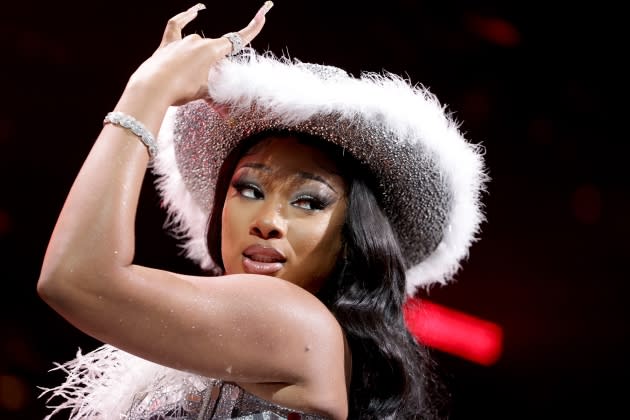Megan Thee Stallion Shares Mental Health Resources for Hotties to ‘Bounce Back Like Bad Bitches Always Do’

On her latest studio album, Traumazine, Megan Thee Stallion uses the deep cut “Anxiety” to confide in her fans about the toll stress and trauma have taken on her mental health. Though she had originally written it to get it off of her chest, her fanbase connected to her experiences. Now, the Houston rapper is launching the website Bad Bitches Have Bad Days Too to share mental health resources with the Hotties.
“Bounce back like bad bitches always do,” the tagline for the site reads, pulling a lyric from the “Anxiety” chorus that continues: “All I really wanna hear is ‘it’ll be okay’/Bounce back ‘cause a bad bitch can have bad days.”
More from Rolling Stone
RS Recommend: Here's How to Boost Your Mental Health From Home
Megan Thee Stallion to Pull Double Duty on 'Saturday Night Live' This Season
Tory Lanez Trial Delayed, Megan Thee Stallion's Ex-Best Friend Subpoenaed By Prosecutors
Bad Bitches Have Bad Days Too breaks down into four subsections. Scrolling through the homepage first reveals free therapy organizations, including the Center for Interactive Mental Health Solutions and the National Alliance on Mental Illness.
Further down, links to the National Crisis Text Line, Suicide & Crisis Lifeline, Stronghearts Native Helpline, and Substance Abuse and Mental Health Administration Helpline are listed under mental health hotlines.
The site’s resource directories section highlights outlets including therapy for Black women and men, psychotherapists of color for LGBTQ+ members, and a number of Black mental wellness collectives, projects, and alliances. Further down, the LGBTQIA+ community resources section shares contact information for Trans Lifeline, TrevorLifeline, LGBT National Youth Talkline, and more.
Last year, Megan appeared on Taraji P. Henson’s series Peace of Mind with Taraji to open up about her relationship with mental health wellness.
“I feel like right now mental health is more important to me, more than ever, because I have more pressure on me than I feel like I used to have … when I was Megan and I wasn’t as criticized and under such a magnifying glass as I am now,” she said at the time.
“As a Black person and when you think of therapy, you think, ‘Oh my gosh, I’m weak.’ Like you think of medication and you just think the worst … It was never a conversation that was on the table,” she continued. “Now in this space, I’ve lost both of my parents. So now I’m like, ‘Oh, my gosh, who do I talk to? What do I do?’ And I just started learning that it’s O.K. to ask for help. And it’s O.K. to want to go get therapy.”
Best of Rolling Stone

 Yahoo Sports
Yahoo Sports 